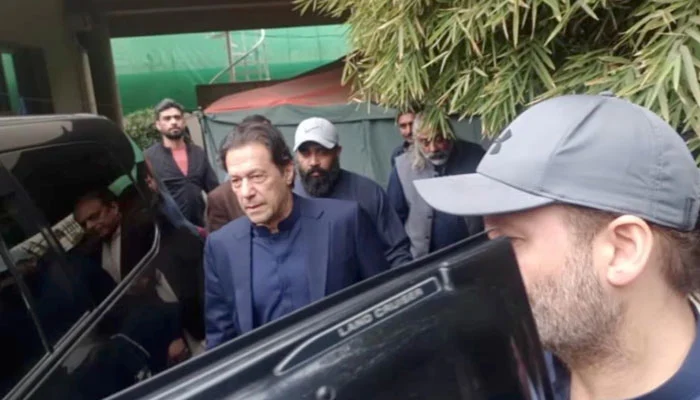Marking an end to the hours-long ruckus created inside the court premises, the Lahore High Court (LHC) on Monday approved Pakistan Tehreek-e-Insaf (PTI) Chairman Imran Khan’s protective bail plea in a case pertaining to protests outside the ECP — Election Commission of Pakistan.
After several notices served to Khan, the PTI chairman ‘finally’ appeared before the LHC to present himself in two separate hearings.
The LHC had adjourned the hearing once again till 7:30pm, directing the security officials to pave way for the PTI chief to reach courtroom.
Despite reaching LHC premises the disposed prime minister could not appear before the court as his convoy is surrounded by massive number of party supporters.
The LHC had granted the former prime minister the last few minutes to present himself before the court after the initial deadline of 5pm lapsed, warning lawyers that the judges would leave if the former prime minister won’t reach the courtroom in the given time.
Khan was directed to appear before the court in person by Justice Tariq Saleem Sheikh for hearing his protective bail petition in a case pertaining to protests outside the Election Commission of Pakistan (ECP).
The LHC had noted the discrepancy in the documents last week during the hearing of a protective bail plea of Khan, who was unwilling to appear in court due to security concerns.
Today’s hearing
After multiple adjournments, a two member bench of the Lahore High Court (LHC) — headed by Justice Ali Baqar Najafi — resumed hearing Pakistan Tehreek-e-Insaf (PTI) Chairman Imran Khan’s bail plea.
Advocate Khawaja Tariq Rahim, Khan’s counsel, apprised the bench that the former prime minister was present in the court’s premises and pleaded with the court to mark the attendance of the wounded leader in his vehicle.
At this, Justice Najafi directed the counsel to produce his client before the court as he has reached the court’s premises.
Referring to the rush inside the court’s premises, the lawyer said that Khan’s plaster would damage if someone pushes him.
“Suspect’s appearance in court is mandatory for interim bail,” remarked the judge.
Meanwhile, the court adjourned the hearing till 7:30pm.
Khan’s counsel, in view of the PTI’s workers massive rush inside the court’s premises, pleaded with the court to mark the attendance of the injured leader in his vehicle but the court turned down the request.
Earlier in the day, when the hearing resumed today after multiple suspensions, Advocate Khawaja Tariq Rahim, counsel for the former prime minister, admitted that the bail petition was not signed by the PTI chief.
Taking note of Imran Khan’s absence despite orders at the outset of the hearing, Justice Sheikh inquired where the PTI chief was as he was asked to appear in court at 2pm.
Khan’s lawyer told the court that his client was on his way and was late due to security issues.
Justice Sheikh told the counsel that resolving the security issues was not his problem and then adjourned the hearing once again.
When the hearing resumed again, lawyer Khawaja Tariq Rahim said that there was traffic on Mall Road which is why the PTI chief was late. He added that the police had communicated to them that Mall Road would remain free from traffic but there was a traffic jam.
The lawyer then told the court that his client does not see himself “bigger than the high court”, adding that the PTI chief will come but arrangements need to be made.
When the judge pressed the counsel to explain the reasons why his client is not appearing, the lawyer said a perception is being created that Imran Khan doesn’t want to appear before the court.
“Let me issue a show cause notice and fix a date after three weeks,” the judge remarked. At this, the counsel said Khan will come tomorrow.
“Not this early,” the judge responded, asking the counsel to let him write down the order as “you are making fun of law”.
The LHC judge noted, “Imran Khan is a leader, a role model and should remain so.”
At this, the counsel promised to produce Imran Khan by 5pm. The judge then said, “This is the last chance for Imran Khan as the court had already granted him concession”.
LHC orders Khan to appear before it on Feb 20
The PTI chief was summoned by the court when it had convened last week and noticed the discrepancy in the petition he had filed.
The former prime minister was summoned by the court when he approached LHC to seek bail in a terror case registered against him over alleged vandalism during the protests in Islamabad against his disqualification by the ECP. However, he was unwilling to appear due to security concerns.
Khan had moved the high court after an anti-terrorism court (ATC) in Islamabad cancelled his bail over non-appearance.
Justice Tariq Saleem Sheikh had directed the PTI chief to appear in person in the case but he failed to do so despite multiple adjournments during the last hearing.
During the course of the hearing, Khan’s lawyer Siddique asked the court that he will be withdrawing the petition.
But Justice Sheikh rejected the request as he had noticed that there are different signs of Khan on the affidavit and power of attorney.
The judge then took notice of the different signatures and adjourned the hearing briefly.
When the court reconvened Khan’s lawyer asked for further time. At this, the court adjourned the hearing till February 20 (today).


 Latest News3 days ago
Latest News3 days ago
 Latest News3 days ago
Latest News3 days ago
 Latest News3 days ago
Latest News3 days ago
 Entertainment3 days ago
Entertainment3 days ago
 Latest News3 days ago
Latest News3 days ago
 Latest News3 days ago
Latest News3 days ago
 Latest News3 days ago
Latest News3 days ago
 Latest News3 days ago
Latest News3 days ago























